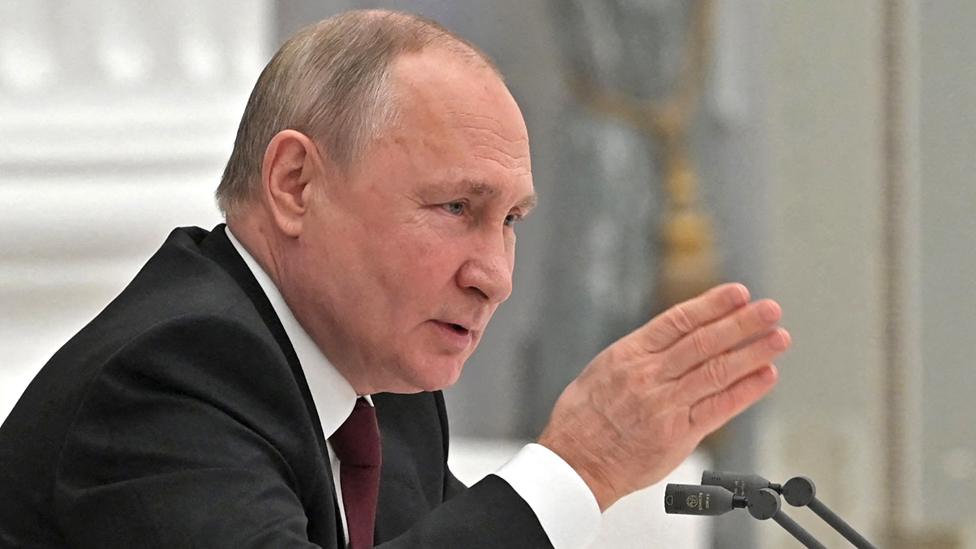Russia won't use tactical nuclear weapons in Ukraine, says ambassador to UK
- Published
Watch: War crimes a ''fabrication'' - Russian ambassador to the UK
Russia's ambassador to Britain has told the BBC he does not believe his country will use tactical nuclear weapons in the war against Ukraine.
Andrei Kelin said that according to Russian military rules, such weapons are not used in conflicts like this.
He also described allegations of war crimes in the town of Bucha as "a fabrication".
And he called UK Foreign Secretary Liz Truss "very belligerent" and inexperienced.
On the use of nuclear weapons, Mr Kelin said Russia has very strict rules for their use, mainly when the state's existence is threatened.
"It has nothing to do with the current operation," he told BBC One's Sunday Morning.
When Vladimir Putin put his nuclear forces on high alert in late February, soon after the invasion, it was widely perceived as a warning.
Mr Putin blamed the development on aggression by the West and Nato. But the UK's Defence Secretary Ben Wallace branded it an attempt to distract people from "what's going wrong in Ukraine", saying Russia was behind schedule on its invasion after just a few days, and trying to "remind the world" it had a deterrent.
Tactical nuclear weapons are those which can be used at relatively short distances, as opposed to "strategic" nuclear weapons which can be launched over much longer distances and raise the spectre of all-out nuclear war.
But the term still includes many types of weapon, including smaller bombs and missiles used on a battlefield. Russia is thought to have about 2,000 tactical nuclear weapons.
The BBC's Clive Myrie asked the ambassador about comments made by UK Foreign Minister Liz Truss, who said the war will only end once Russian President Vladimir Putin removes his troops entirely.
Mr Kelin said Ms Truss was "very belligerent".
He said she was "neither a professional military man" nor experienced as foreign secretary. "If she would like to continue the war she will prolongate the conflict," he added.
In a sometimes terse exchange, the ambassador denied Russian forces were shelling civilians and said allegations of war crimes in the town of Bucha were a "fabrication".
Asked the question, "Why is Russia conducting this war in this way, committing war crimes?" Mr Kelin replied: "The mayor of Bucha in his initial statement has confirmed that Russian troops has left, everything is clean and calm, the town in a normal state.
"Nothing is happening, no bodies are on the street. But next, after it has been done - but anyway..."
Myrie then pressed him: "So this is all made up, Sir? This is all a fabrication? All this evidence is a fabrication?"
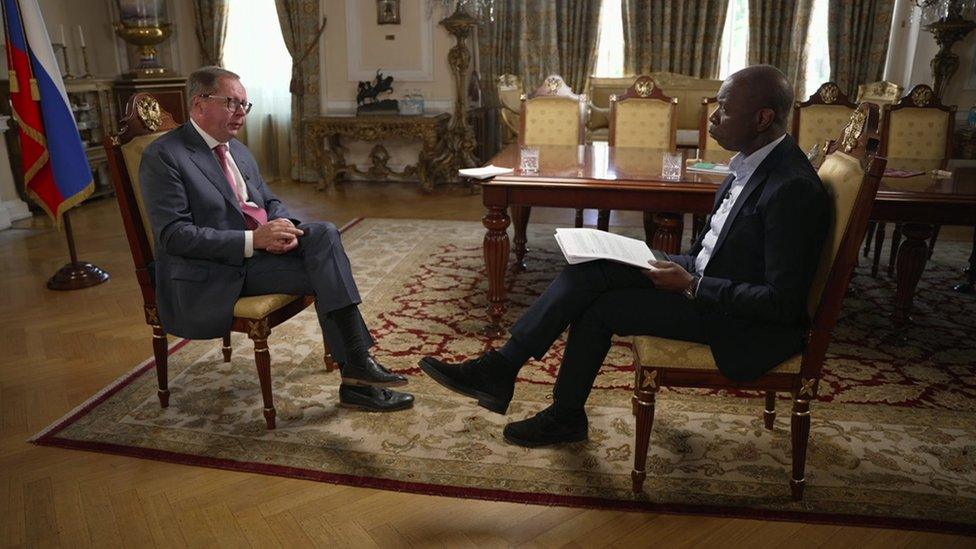
The ambassador claimed allegations of war crimes in the town of Bucha were a "fabrication" - despite physical evidence, satellite imagery and eyewitness acounts
"In our view it is a fabrication. It is used just to interrupt negotiations," the ambassador replied.
Russia has made such allegations before, with Foreign Minister Sergei Lavrov earlier claiming that footage of bodies in Bucha was "staged" after the Russians withdrew.
This was contradicted by numerous eyewitness accounts from residents, who told the BBC that Russian troops had summarily executed their loved ones.
"He was just a peaceful man, a family man, a welder, who struggled with a spine fracture and was disabled all his life," one man said of his murdered son-in-law.
Satellite imagery also appears to directly contradict Moscow's position, showing bodies lying in the street nearly two weeks before the Russians left the town.
The ambassador was also asked about CCTV footage of Russian soldiers killing unarmed civilians in Ukraine.
Mr Kelin said the footage was "probably a piece of a film or a piece of a game or a joke or whatever, it's a computer games set".

Ambassador plays to Kremlin narrative

What we heard from Russia's UK ambassador Andrei Kelin is what we've been hearing for years from Russian officials whenever their county is accused of anything.
All accusations are rebuffed, all evidence of Russian complicity is dismissed.
What you end up with is this parallel reality in which CCTV footage of Russian soldiers shooting dead unarmed Ukrainian civilians is dismissed as a joke or a computer game.
The horrors of Bucha are dismissed as a fabrication, and the levelling of residential areas of Mariupol is brushed aside as either collateral damage or blamed on Ukrainian soldiers.
In other words, none of this is ever Russia's fault, everyone is against Russia, everyone is blaming Russia, everyone is accusing Russia and it claims it is the innocent party.
This is the Kremlin narrative which we've heard many times before.
We heard it after the Salisbury poisonings, we heard it after the attempted assassination of the Russian opposition leader Alexei Navalny and we're hearing it again now.

Watch Clive Myrie's full interview with Russia's ambassador to Britain.

Related topics
- Published13 April 2022
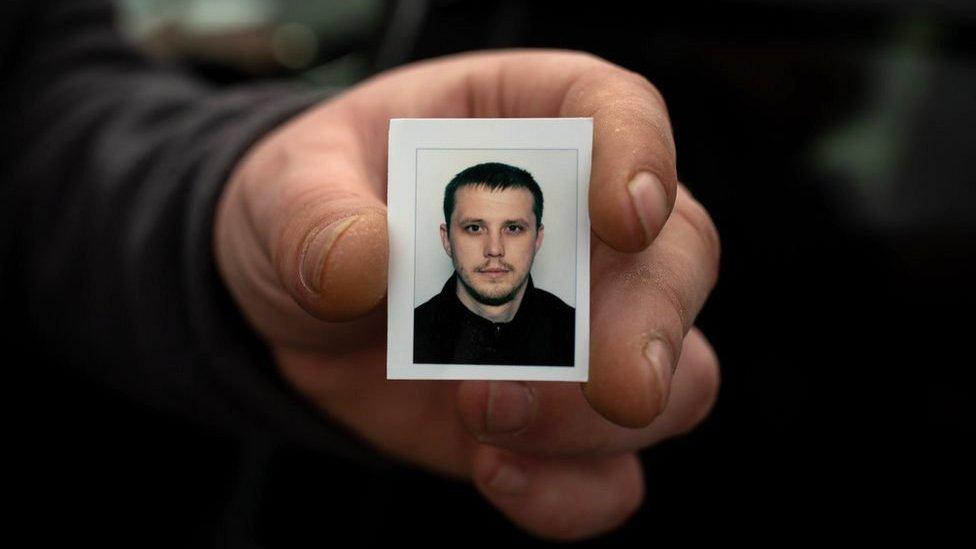
- Published11 April 2022
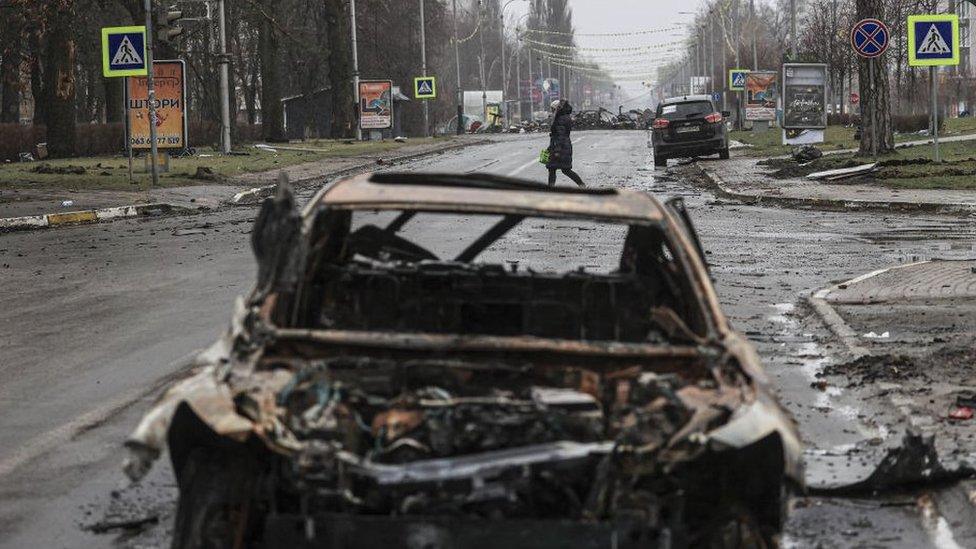
- Published6 April 2022
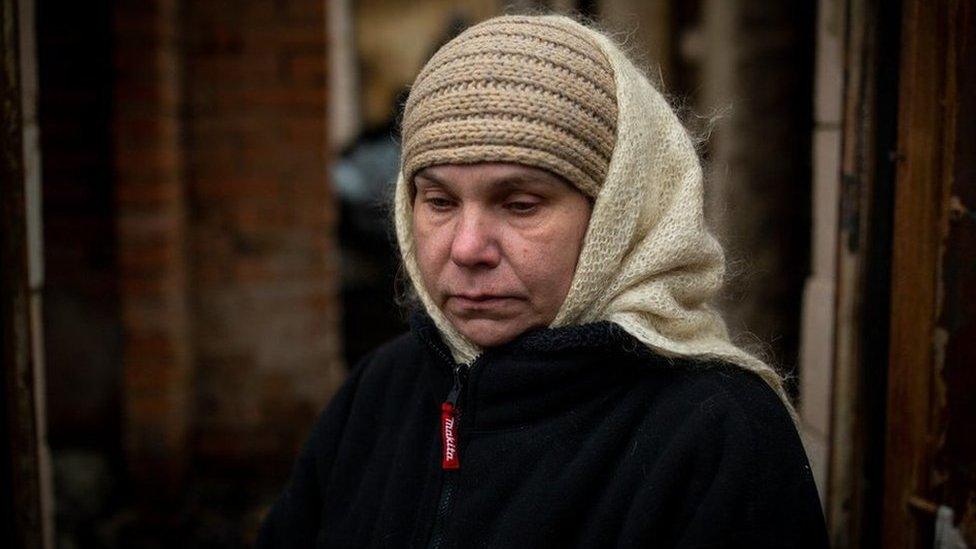
- Published28 February 2022
